Firms are relocating younger employees, and serviced apartment operators are responding with new products.
 Lanson Place Hotel, Hong Kong
Lanson Place Hotel, Hong Kong 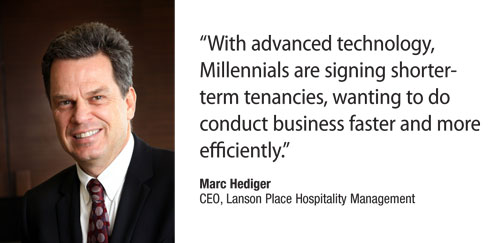
3 hottest relocation cities in Asia now and why
Hong Kong, Singapore and Shanghai are still the hottest Asian cities to relocate to, despite capital investments trending outward from these cities.
Considered the gateway to China, Hong Kong consistently offers an exciting city for expats: easy to reside in, great to establish business networks and very family friendly. Within the past 10 years, the city has seen a 50 per cent growth in the extended stay market.
Global MNCs will also easily consider relocating their employees to Hong Kong’s friendly neighbouring competitor cities though, specifically Singapore or Shanghai.
Singapore saw a 30.4 per cent increase in serviced apartment supply last year and is perceived to be a city as easy to move to as Hong Kong. Shanghai continues to boom; although serviced apartment inventory have quadrupled in the past four years, occupancies are still in the 80 per cent levels. We have just announced our fifth property there.
Aside from these three established key cities in Asia, Lanson Place residents are also relocating to other prime cities such as Kuala Lumpur, Bangkok, Jakarta and Manila. Most offer more affordable living, but are also exciting up-and-coming business destinations.
What’s trending
We’ve seen a shift in resident demographics throughout all our properties in Asia-Pacific, mostly in the past two years. With advanced technology, Millennials are signing shorter-term tenancies, wanting to do conduct business faster and more efficiently. Baby boomers and Gen X are residing without families, while younger families are seeking smaller and more versatile units.
More significantly, residents who have been educated abroad are coming back to their own countries and relocating from within the Asia-Pacific region. In China, corporations are expanding their companies to second- and third-tier cities but are still seeking a comfortable yet affordable lifestyle for their employees.
How operators match changing trends
Lanson Place has specifically introduced a third business model called Serviced Suites by Lanson Place to address the changing trends and needs of corporates relocating.
This lean, efficient and contemporary serviced apartment style not only provides a higher return in investment for developers but most importantly offers residents a niche lifestyle, no matter the location or purpose of their residency.
Smaller units are creatively designed with unique combined open living and working spaces; public areas are the extension of their homes offering seamless connectivity throughout the entire development; ‘grab n go’ F&B concepts and energising activities promote well-being. This model forms the majority of pipeline deals for Lanson Place, be it in secondary locations in key gateway cities or 1.5-tier cities within China.
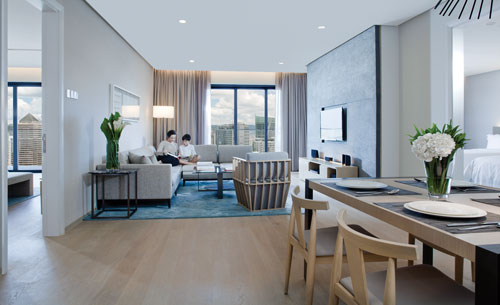
Fraser Residence Kuala Lumpur
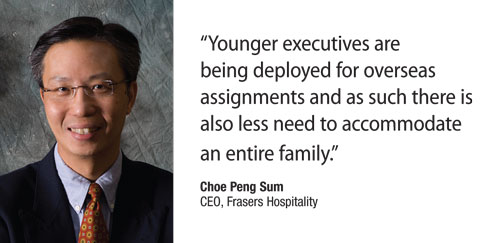
3 hottest relocation cities in Asia now and why
Singapore – the world’s number one city for business friendliness – remains one of the hottest business destinations in Asia. A key gateway city for the South-east Asia market, it is known for its open-trade environment, corruption-free government and high quality of living, attracting large MNCs pursuing business opportunities in the region.
Kuala Lumpur has become an increasingly attractive business destination particularly for global manufacturers, offering lower tax and stricter intellectual property protection regimes, in comparison with other markets like China. It is ranked among the top 15 countries most favoured by MNCs in 2014-2016 with various government incentives for foreign companies geared towards making Malaysia a gateway to the ASEAN market.
Ho Chi Minh City and Hanoi have also been successful in attracting foreign investment, quickly becoming an important market for companies looking to expand into second- and third-tier cities in Asia. Some of our residents who have completed their assignments in Jakarta have been relocated to Vietnam to take on new assignments.
What’s trending
We have observed that overseas assignments are increasingly shorter, on a more regular basis of between two weeks to a month, as opposed to the previous trend of longer assignments of up to three months at a time. Younger executives are being deployed for overseas assignments and as such there is also less need to accommodate an entire family. These, plus the increased overall appreciation of the advantages of serviced apartments, have contributed to the rising adoption rate of our serviced apartments in general and the one- and two-bedroom apartments in particular.
Most companies also now offer staff flexi-benefits packages as a measure to improve cost efficiency, where expatriates have the option of cashing in on their allocated accommodation expense if it is not fully utilised. This has led some expatriates to either opt for more affordable alternatives or shorten their length of stay.
How operators match changing trends
Plans are in place to further boost our inventory in these three cities as part of our goal of achieving 30,000 apartments units globally by 2019.
With the trend of shorter stays in mind, our newer properties have been configured with a larger number of one- and two-bedroom apartments to cater to more business executives who now tend to travel on their own, while at the same time maintaining the spacious defined living, kitchen, bedroom and study areas our serviced apartments are known for.
We also work closely with our corporate clients to better understand their evolving needs and customise solutions to complement their travel and relocation policies.

Oakwood Residence Sukhumvit, Thonglor Bangkok
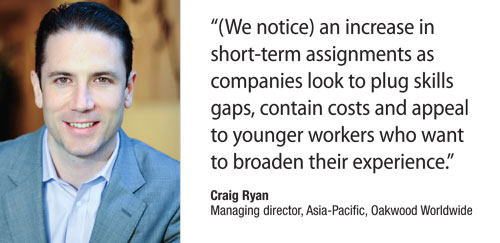
3 hottest relocation cities in Asia now and why
Both Singapore and Hong Kong lead the relocation markets in Asia-Pacific as they continue to serve as business hubs for multi-national organisations.
As one of the fastest-growing economies in the region, China is also a key relocation market. Encouraged by the Chinese government’s opening up and increased pace of reform, more companies are establishing operations in China’s emerging cities in the mid-west. This trend, combined with the increased demand for serviced apartment in primary cities such as Beijing and Shanghai, is stimulating new serviced apartment projects, resulting in rapid development and progression across China.
Oakwood Worldwide has an aggressive expansion plan for China, with a second property in Beijing and one in Sanya and Haikou in the pipeline. We have also expanded our Asia-Pacific operations with the opening of an office in Hong Kong to meet the increased demand for serviced apartments in the region.
What’s trending
Some of the key trends we have noticed in the global mobility industry:
- An increase in short-term assignments as companies look to plug skills gaps, contain costs and appeal to younger workers who want to broaden their experience.
- A drop in the average age of assignees – in 2014, the 30-39-year-old age bracket had one of the highest percentages of international assignees (33 per cent), taking over from the 50-59-year-old age bracket, as reported in the 2014 Brookfield Global Relocation Trends Survey.
- Continued growth in the number of assignments in Asia-Pacific due to the increase in business travel.
- The growth of emerging markets as companies continue to broaden their reach and send assignees as project work increases.
How operators match changing trends
Oakwood Worldwide has a four-pronged approach in preparing to meet the needs that will result from the aforementioned trends:
- Robust development strategy in Asia-Pacific: Oakwood Worldwide is looking to double our current Asia-Pacific branded portfolio of 28 properties over the next three to five years.
- The launch of a hotel desk at the end of 2014 to give clients access to accommodation in smaller and remote cities where serviced apartments are not as readily available. This also provides flexibility for short to medium, and long-term stays.
- Strengthening our vetted supplier network: In Asia-Pacific, Oakwood Worldwide offers more than 400 properties across the region through local network partners.
- Evolving business model: By using Lanyon to contract rates from serviced apartment providers and hotels, we help organisations save time and resources, offering greater efficiency throughout the relocation.

Ascott Kuningan Jakarta
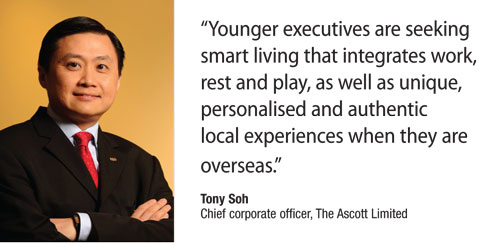
3 hottest relocation cities in Asia now and why
Indonesia, the Phlippines and China.
Indonesia is the biggest economy in South-east Asia while the Philippines’ strong economic fundamentals continue to attract foreign investors, in particular the back-office processing operations sector.
In China, demand for serviced residences remains strong in the first- and second-tier cities of Shanghai, Beijing and Guangzhou.
Given the strong economic potential of Asia, we will continue to deepen our presence and grow our network in Asia. We have expanded Ascott’s presence in key cities such as Jakarta, Manila and Shanghai with the opening of Ascott Kuningan Jakarta, Ascott Bonifacio Global City Manila and Ascott Heng Shan Shanghai in recent months.
What’s trending
With increasing talent mobility, our serviced residences continue to receive many guests who stay for an extended period of a month or more for relocation or project assignments.
As travellers get savvier and companies tighten their travel budgets, they recognise the value that serviced residences provide as compared with traditional hotels.
They appreciate the flexibility for project team members to share an apartment while enjoying the privacy of individual bedrooms and the convenience of a kitchen.
Younger executives are seeking smart living that integrates work, rest and play, as well as unique, personalised and authentic local experiences when they are overseas.
Staying healthy while on the move is also a trend.
How operators match changing trends
By constantly innovating and looking at new ways to delight guests.
Ascott is the first global serviced residence company to embrace smart home technologies. We have forged an exclusive partnership with Samsung Asia to jointly develop smart solutions customised for serviced residences. Guests will be able to use their mobile or wearable devices to control washing machines, refrigerators, smart TVs and the like.
We aim to test-bed the technologies at selected Ascott serviced residences by the first half of 2016, with plans to roll out to our properties worldwide in phases.
We have also launched the Ascott Lifestyle programme, offering guests bespoke cultural, gastronomical, local and wellness experiences.
For instance, to help guests settle in a new city, there are local language classes and guided tours of the local market. Guests can stay fit by exploring the neighbourhood they are in with our customised jogging routes.
There are also cultural programmes such as batik making workshops and personal cooking sessions being conducted right in their apartment.
This article was first published in TTG Asia, September 18, 2015 issue, on page 13. To read more, please view our digital edition or click here to subscribe.




















